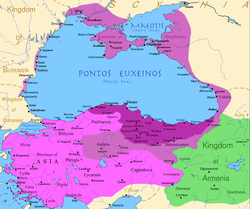
Back مملكة البنطس Arabic Reinu del Ponto AST Pont çarlığı Azerbaijani پونتوس شاهلیغی AZB Понтийско царство Bulgarian Regne del Pont Catalan Königreich Pontos German Βασίλειο του Πόντου Greek Reino del Ponto Spanish Pontoko Erresuma Basque
This article needs additional citations for verification. (November 2019) |
Kingdom of Pontus | |||||||||
|---|---|---|---|---|---|---|---|---|---|
| 281 BC–62 AD | |||||||||
 The Kingdom of Pontus at its height: before the reign of Mithridates VI (dark purple), after his early conquests (purple), and his conquests in the first Mithridatic wars (pink) | |||||||||
| Status |
| ||||||||
| Capital | Amaseia, Sinope | ||||||||
| Common languages | Greek (official after 3rd century BC,[1] coastal cities) Persian, Armenian (after 115 BC) and Anatolian languages (regional and dynastic) | ||||||||
| Religion | Syncretic, incorporating Greek polytheism, Iranian religion, and local Anatolian religion. | ||||||||
| Government | Monarchy | ||||||||
| Basileus | |||||||||
• 281–266 BC | Mithridates I Ktistes | ||||||||
• 266–250 BC | Ariobarzanes | ||||||||
• c. 250–220 BC | Mithridates II | ||||||||
• c. 220–185 BC | Mithridates III | ||||||||
• c. 185 – c. 170 BC | Pharnaces I | ||||||||
• c. 170 – 150 BC | Mithridates IV and Laodice | ||||||||
• c. 150 – 120 BC | Mithridates V Euergetes | ||||||||
• 120–63 BC | Mithridates VI Eupator | ||||||||
• 63–47 BC | Pharnaces II | ||||||||
• 47–37 BC | Darius | ||||||||
• 37 BC | Arsaces | ||||||||
• 37–8 BC | Polemon I | ||||||||
• 8 BC – 38 AD | Pythodorida | ||||||||
• 38 AD – 62 AD | Polemon II | ||||||||
| History | |||||||||
• Founded by Mithridates I | 281 BC | ||||||||
• Conquered by Pompey of the Roman Republic, remained as a client state (eastern part of the kingdom). | 63 BC | ||||||||
• Annexed by the Roman Empire under Emperor Nero. | 62 AD | ||||||||
| |||||||||
Pontus (Greek: Πόντος Pontos) was a Hellenistic kingdom centered in the historical region of Pontus in modern-day Turkey, and ruled by the Mithridatic dynasty of Persian origin,[2][3][4][5] which possibly may have been directly related to Darius the Great of the Achaemenid dynasty.[6][5] The kingdom was proclaimed by Mithridates I in 281 BC[7] and lasted until its conquest by the Roman Republic in 63 BC.[8] The Kingdom of Pontus reached its largest extent under Mithridates VI the Great, who conquered Colchis, Cappadocia, Bithynia, the Greek colonies of the Tauric Chersonesos, and for a brief time the Roman province of Asia. After a long struggle with Rome in the Mithridatic Wars, Pontus was defeated.[9]
The kingdom had three cultural strands, which often fused together: Greek (mostly on the coast), Persian, and Anatolian,[10][5] with Greek becoming the official language in the 3rd century BC.[11]
- ^ Brian McGing, “PONTUS,” Encyclopædia Iranica, online edition, 2004, available at https://www.iranicaonline.org/articles/pontus
- ^ The Foreign Policy of Mithridates VI Eupator, King of Pontus, by B. C. McGing, p. 11
- ^ Children of Achilles: The Greeks in Asia Minor Since the Days of Troy, by John Freely, p. 69–70
- ^ Strabo of Amasia: A Greek Man of Letters in Augustan Rome, by Daniela Dueck, p. 3.
- ^ a b c McGing, Brian (2004). "Pontus". Encyclopaedia Iranica, online edition. Retrieved 2019-11-14.
- ^ Bosworth, A. B.; Wheatley, P. V. (November 1998). "The origins of the Pontic house". The Journal of Hellenic Studies. 118: 155–164. doi:10.2307/632236. ISSN 2041-4099. JSTOR 632236. S2CID 162855144.
- ^ Strabo Geography 12.3
- ^ Östenberg, Ida (December 2013). "Veni Vidi Vici and Caesar's Triumph". Classical Quarterly. 63 (2): 819. doi:10.1017/S0009838813000281. ISSN 0009-8388. S2CID 170291549.
- ^ Kantor, Georgy (2012), "Mithradatic wars", The Encyclopedia of Ancient History, Blackwell Publishing, doi:10.1002/9781444338386.wbeah09172, ISBN 9781444338386
- ^ Children of Achilles: The Greeks in Asia Minor Since the Days of Troy, by John Freely, p. 69–70
- ^ The Foreign Policy of Mithridates VI Eupator, King of Pontus, by B. C. McGing, p. 11
© MMXXIII Rich X Search. We shall prevail. All rights reserved. Rich X Search